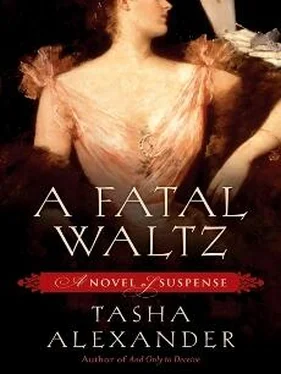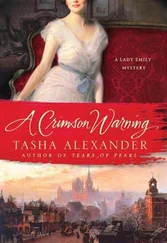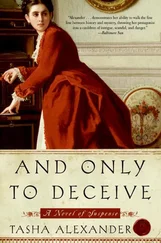Cécile met us at the Gare de l’Est when we arrived in Paris, and together we boarded the Orient Express. Along with an inordinate number of trunks and her minuscule dogs, Brutus and Caesar, Cécile had brought a picnic for us to share, preferring to dine in the privacy of our compartment so that we could speak freely about the plight of the Brandons. Although the food in the dining car would no doubt have been spectacular—we were on board the most luxurious train in Europe—we did not much suffer. Cécile’s basket was filled with magnificent treats, all of which were served on china and silver by an attentive member of the wagons-lits staff. Jeremy retired soon after we’d finished eating, though I suspect he did not stay alone long. The lure of the smoking car and the company he’d find there would have been too much for him to resist.
The stress of the previous days left me exhausted. The valet had made up the bed in my compartment, which was snug and cozy and reminiscent of the most comfortable rooms in a country estate. Very small rooms, of course, but the effect—achieved with a combination of wood paneling and dark paint with gilt trim—was lovely. When I crawled into my surprisingly soft bed, the lull of the car’s movement on the track sent me to sleep almost at once. Jeremy’s theory proved sound: By the time we reached the Westbanhof station in Vienna the next evening, my mind was clear and focused.
I’d never been to Vienna before, but had always imagined it to be an ornately beautiful place. The reality of it did not disappoint. The Ringstrasse, which Emperor Franz Joseph had ordered built over the remains of the city’s ancient walls, was a series of wide, circular boulevards lined with grand buildings: the Kunsthistorisches Museum, which housed the imperial art collection, the Naturhistorisches Museum, one of the world’s finest natural history museums, and the opera, among others. Now, in winter, with snow covering them, they all looked like prettily decorated cakes set among parks on a tree-lined cobbled street.
We’d reserved suites at the exquisite Hotel Imperial, which had been constructed some years earlier by the Prince of Württemberg as his palace. He sold it when he decided to leave Vienna, and the buyers converted it into a hotel. The prince’s private apartments on the belle étage had been turned into an enormous suite, and it was here that Cécile and I ensconced ourselves, surrounded by every luxurious thing. We had two bathrooms, beds dressed in the finest linens, and multiple sitting rooms, walls covered in pale blue silk that highlighted elaborately carved moldings. Electric chandeliers lit the room, but candles had been placed strategically throughout, in magnificent silver holders, in case the suite’s occupants desired softer light.
Even the route to our rooms was spectacular, up the grand staircase, fashioned from gleaming, pale marble. The high ceiling, smooth columns, and classically styled statues on the landing were worthy of Versailles, although Cécile was quick to point out that the scale was far too small to be part of the Sun King’s palace. Still, it was difficult not to feel royal in such impressive surroundings.
It was too late in the evening to make an unannounced visit, so I instead sent a note to the countess telling her to expect me in the morning. I hoped her contacts with the British intelligence community might prove useful to me. After Meg helped me into a favorite gown—crimson silk covered with intricate beadwork—I joined my friends for dinner in the hotel’s dining room, where the food, all of it delicious, was more French than I would have expected. The next morning, the concierge gave me directions to the von Langes’ house, and I left the Imperial by eight o’clock, feeling not the slightest concern that I might be calling too early. Though I should be loath to admit it, I rather liked the idea of disturbing Kristiana. Regardless, I’d given her fair warning.
I’d expected that Cécile would not be able to come with me. She was here, after all, to see her friend, the empress. But although she left the hotel at the same time I did, her destination was not the imperial palace. Instead, she headed for the studio of an artist whose work I greatly admired: Gustav Klimt. He was to paint her portrait. When I asked her if the empress would mind that she did not come to her first, Cécile smiled, and there was a wicked gleam in her eye.
“No one would understand better than Sissi,” she said, stepping into a carriage and leaving me at the curb.
The Viennese were early risers. Already, people bundled in furs were streaming in and out of shops, bakeries, and coffeehouses, rushing across the narrow snow-covered streets that cut through the city like a spider’s web. My feet were wet, my unlined leather boots no match for the snow, and by the time I reached the countess’s imposing residence, it felt as if the very fabric of my coat was frozen. The von Langes’ house was palatial, its baroque grandeur dwarfing the very street on which it stood. The interior, full of stuccowork—cherubs and scenes from mythology everywhere I turned—overwhelmed me with its intricate beauty. As a servant in formal livery led me to an impossibly warm drawing room, my opinion of Kristiana thawed along with my toes.
For a moment, that is.
She kept me waiting nearly half an hour before she glided into the room and sat directly across from me. “You poor child. You look positively frigid,” she said. “Something warm to drink?”
“No, thank you. I’m perfectly comfortable.”
“I didn’t expect Colin to bring you to Vienna so soon.”
“He’s in Berlin. I came on my own, and am hoping that you can assist me.”
“Berlin?” She smiled, laughter in her bright eyes. “Is that what he told you?”
“I’m here because Robert Brandon thought you might know something about a message Lord Fortescue received while we were at Beaumont Towers.”
She laughed. “Oh, dear, you shouldn’t involve yourself in these things. It’s unseemly.”
“For me but not for you?” My limbs were beginning to throb as the numbness faded from them. “I don’t like you any more than you like me. But the fact is, we may be able to assist each other. It would be foolish to let our personal—”
“Assist each other? How do you plan on assisting me, Lady Ashton? I can’t imagine any way in which you could do so.”
“I’m discreet and able to keep a secret. No doubt at some point in your own work, you might benefit from an ally.”
“Do not flatter yourself by thinking you could ever be my professional equal.” She was resting her elbow on the arm of the sofa and raised a single finger to hold up her chin as she scrutinized every detail of my face. “There is only one thing you have that I want.”
I met her gaze and held it with my own. “Colin?”
She nodded. “Release him to me, and I will tell you what you desire to know.”
“I don’t have him on a chain, Countess, and I’m not the one who decided to leave you.”
“Of course not. He would never stand being on a chain. But if you were to change your behavior—flirt in a more serious manner with other gentlemen, for example—he might be more inclined to see me again. If you took a lover, he would too.”
“I won’t do that,” I said.
She shrugged. “Then Mr. Brandon’s life is worth very little to you.”
“I’ll find out who sent the message on my own.”
“Not before they hang your friend.” She laughed again, and I had to restrain myself from reaching out to slap her.
“Frankly, I’m shocked that you would stoop to seek my assistance to seduce your former lover,” I said. “I assume he was your lover? Wouldn’t you be humiliated to have me hand him back to you?”
Читать дальше












